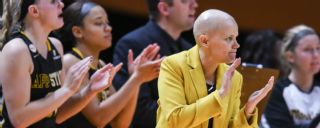|
So many hands helped keep Angel Elderkin from falling. The Appalachian State women's basketball coach, who was diagnosed with endometrial cancer this past summer, could have given up on treatment. She would have, at one point, if not for the doctors at the UNC Lineberger Comprehensive Cancer Center in Chapel Hill, North Carolina. Three more appointments, they reminded her. Imagine what it would be like, the doctors said, if after all this effort, after 29 straight days of radiation and three rounds of chemotherapy, the cancer came back because she quit early. "It was the lowest time," Elderkin, who was 39 at the time of her diagnosis, said. "Just not being able to be at practice and be around the team and do what I love to do, I think it just put me in a really, really dark place." That dark place is one that's familiar to cancer survivors. Some of the people who shared that brutal experience were the ones who helped Elderkin hold on. Elderkin's mother, Carolyn, who died in 2014. North Carolina coach Sylvia Hatchell. Former Virginia coach Debbie Ryan. All of them are connected by some form of the life-threatening disease that blindsided Elderkin during the offseason. It took all of them to help Elderkin reach the point where she is undergoing CAT scans once every six months and getting blood work done occasionally. "I didn't understand truly what mental toughness was even though I preach it," she said. "I didn't even get it until this season." Just getting a diagnosis required a helping hand. Elderkin wasn't feeling well and was "getting the runaround" in Boone, North Carolina, where she resides, while trying to figure out what was wrong. One of her assistant coaches, Emily Roberts, is the niece of Andrew Calder, an associate head coach at UNC. Roberts sent Calder a text asking Hatchell -- a cancer survivor -- to help Elderkin with scheduling an appointment with a doctor. Elderkin got the appointment, thanks to Hatchell. Then came a crushing diagnosis for Elderkin, followed by a second assist from Hatchell. "I needed her at that moment in time as a mentor and as somebody who went through something tougher than me but was already on the other side," Elderkin said. "It's hard to say how would I have been, what would I have done. She was just there." Hatchell's presence went beyond anything expected of a virtual stranger. There was the hospital -- the nurses knew Hatchell well from her treatments, and they loved having the Tar Heels coach around again. There was Elderkin's phone with messages from friends, which made her feel less alone. There could even be a page out of the book Hatchell's wrote in 2016 about her experience with leukemia. Elderkin knew she was not alone, and in moments when she felt herself slipping, she always seemed to find a new person to lift her up. Then there was Ryan, who had pancreatic cancer in 2000, keeping in touch with her former assistant coach during Elderkin's treatment. Former ESPN sideline reporter Holly Rowe's "bald is beautiful" moniker helped Elderkin come to terms with her own hair loss. And memories of Elderkin's mother reminded Elderkin that even on the hardest days, she could be strong. Those connections, and the connection she developed with Hatchell, helped Elderkin return to coaching. She's feeling better every day, she said, and she can't imagine where she'd be if Hatchell hadn't helped out. Like Elderkin, Hatchell had her heroes, too. When Hatchell was treated for leukemia, she received daily calls from Tennessee legend Pat Summitt when she was first diagnosed and took a leave of absence for the 2013-14 season. Former SportsCenter anchor Stuart Scott, himself in the throes of treatment, also contacted Hatchell before he passed away in 2015. Fellow UNC coach Roy Williams did the same. Even Duke men's hoops coach Mike Krzyzewski reached out -- rivalries be damned. Hatchell still has all the messages on her phone. Those are the things that get people through that dark place Elderkin talked about. They seem like small gestures. They're not. "The support that you get from other coaches and athletes, players, people involved in the sports world -- we compete against each other, we try to win games, but when one of us has our backs against the wall in a life-threatening situation, no one comes to the rescue quicker," Hatchell, 64, said. "It's about passing things on." Now, Elderkin, who is in remission, is getting ready to support others. "I know for me, personally, it'll be a mission, kind of like Sylvia, where I will help people and be there for them and just whatever I can do," she said. "Even after the season, there's a cancer center in Boone, and even though I didn't go there for my treatments, I want to just go there and hang out with the people while they're getting treatment and just give back." She knows from experience that being there, however she can, will make a difference.
|

